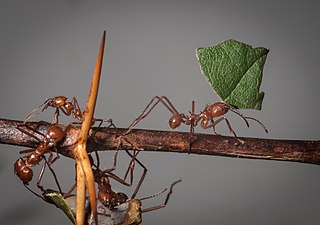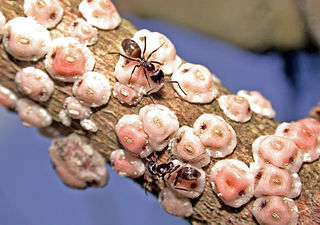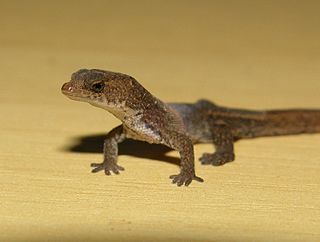
Ants are eusocial insects of the family Formicidae and, along with the related wasps and bees, belong to the order Hymenoptera. Ants evolved from vespoid wasp ancestors in the Cretaceous period. More than 13,800 of an estimated total of 22,000 species have been classified. They are easily identified by their geniculate (elbowed) antennae and the distinctive node-like structure that forms their slender waists.

Fungus-growing ants comprise all the known fungus-growing ant species participating in ant–fungus mutualism. They are known for cutting grasses and leaves, carrying them to their colonies' nests, and using them to grow fungus on which they later feed.

Myrmicinae is a subfamily of ants, with about 140 extant genera; their distribution is cosmopolitan. The pupae lack cocoons. Some species retain a functional sting. The petioles of Myrmicinae consist of two nodes. The nests are permanent and in soil, rotting wood, under stones, or in trees.

Dorymyrmex is a genus of ants in the subfamily Dolichoderinae.

The streak-throated hermit, also known as the Rupurumi hermit, is a species of hummingbird in the family Trochilidae. It is found in Brazil, Colombia, Guyana, and Venezuela.

The rufous-vented ground cuckoo is a Vulnerable species of cuckoo in the tribe Neomorphini of subfamily Crotophaginae. It is found in Bolivia, Brazil, Colombia, Costa Rica, Ecuador, Nicaragua, Panama, and Peru.

The rufous-capped antthrush is a small species of bird in the family Formicariidae located in the order Passeriformes. It is considered to be uncommon but widespread, found in Bolivia, Brazil, Colombia, Ecuador, French Guiana, Guyana, Peru, Suriname, and Venezuela. The rufous-capped antthrush is typically found inhabiting the shady floor of tall, humid forests on solid ground, and is occasionally spotted in transitional forests (várzea) and savanna forests (Suriname).

The Amazonian antshrike is a species of bird in the family Thamnophilidae, the antbirds. It occurs in the Amazon Basin of Brazil, and east to Maranhão state; also Amazonian Colombia, Ecuador, Peru, and Bolivia. It is in the Guianas in Guyana, Suriname and French Guiana, also two regions of Venezuela. Its natural habitats are subtropical or tropical moist lowland forests and subtropical or tropical swamps.
Ampelozizyphus is a genus of plants in the family Rhamnaceae. It includes two species Ampelozizyphus amazonicus, which is known from Amazonian Peru, Colombia, Venezuela, Guyana, Suriname, French Guiana, and Brazil, and Ampelozizyphus guaquirensis, native to the central portion of the Coastal Cordillera of Venezuela.

Lachnomyrmex fernandezi is a species of ant in the subfamily Myrmicinae.

Lachnomyrmex laticeps is a species of ant in the subfamily Myrmicinae.

Lachnomyrmex lattkei is a species of ant in the subfamily Myrmicinae.

Lachnomyrmex longinoi is a species of ant in the subfamily Myrmicinae found in Honduras, Nicaragua, Costa Rica.

Lachnomyrmex mackayi is a species of ant in the subfamily Myrmicinae.

Lachnomyrmex nordestinus is a species of ant in the subfamily Myrmicinae.

Lachnomyrmex regularis is a species of ant in the subfamily Myrmicinae.

Lachnomyrmex victori is a species of ant in the subfamily Myrmicinae.

The Brazilian pygmy gecko is a species of South American lizard in the family Sphaerodactylidae. The species is monotypic in the genus Chatogekko. It grows to a maximum total length of only 24 millimetres (0.94 in). It is found in leaf litter on the forest floor, and preys on springtails and mites. The species is oviparous.

Lachnomyrmex is a Neotropical genus of ants in the subfamily Myrmicinae. The genus consists of 16 species restricted to the Neotropics, known from southern Mexico to northern Argentina. They are most often found in the leaf litter of wet forests, with nests located on the ground. Workers forage alone, apparently without recruiting nestmates or using pheromones. Within the tribe Stenammini, they seem to be most closely related to the genera Lordomyrma of Indo-Australia and Cyphoidris of Africa.
Dorymyrmex amazonicus is a Neotropical species of ant in the subfamily Dolichoderinae.


















